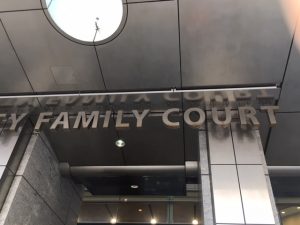
Family court (by David Lat).
Loyal readers know that this column has closely followed the multiple shocking immigration cases where children born to American same-sex couples were nevertheless denied U.S. citizenship. For at least four families that brought suit against the government — represented by the nonprofit legal group Immigration Equality, as well as Lambda Legal and other pro bono counsel — the government has insisted on applying the section of the immigration code applicable to “unwed” parents, despite the parents being legally wed. What was the difference between these couples and others that had no issues? Only that these couples were gay and used assisted reproductive technology.
In each case, the government advanced the argument that the “wed” section of the immigration code applies only when both parents are genetically related to the child, which, with current technology, is difficult for same-sex couple parents. And of course, that underlying biological fact causes immigration officials to scrutinize more closely gay couples than they do straight ones, meaning that a straight couple using assisted reproductive technology to grow their family often won’t face the same issues as a same-sex couple.

How Legisway Helps In-House Teams Manage All Legal Matters In One Trusted Place
Operate with AI driven insights, legal intake, unified content and modular scalability to transform efficiency and clarity.
In good news, the couples facing discrimination based on the government’s interpretation have won resounding victory after victory in U.S. courts. First was the Dvash-Banks case, where two dads won a victory for one of their twin sons, and then recently had the ruling affirmed on appeal before the Ninth Circuit. The Kivitis, too, won in Maryland, and the Gregg-Mize family impressively won in the Deep South, where a federal judge appointed by President Donald Trump in Georgia held that the government’s interpretation of the immigration code raised serious constitutional concerns. Given that the government was initially appealing each of these losses, it looked like the fight would continue. But that all changed last week.
In double good news, the government opted not to appeal the Gregg-Mize decision, and dropped the Kiviti appeal. Double yay!
How Good Is The Good News?
It’s not clear how far of a reach the government’s possible reversal on the immigration code’s application to same-sex couples will be. The government may yet appeal the Ninth Circuit level loss in the Dvash-Banks to the U.S. Supreme Court. And, in the meantime, a similar case with the Zaccari-Blixt family, is still at the trial level, and it seems like the government may try to litigate the same issue there. But let’s hope that last week’s news indicates an impending complete reversal — no more appeals for Dvash-Banks or similar families, a road to recognition for Zaccari-Blixt, and future children of U.S. citizen same-sex married couples being fairly and squarely under the “wed” section of the immigration code.

How LexisNexis State Net Uses Gen AI To Tame Gov’t Data
Its new features transform how you can track and analyze the more than 200,000 bills, regulations, and other measures set to be introduced this year.
Despite the good news, there are at least three red flags for LGBTQ+ families. First, last month, in a case where the U.S. Supreme Court rejected a request to hear an appeal of the Kim Davis case — the Kentucky clerk who refused to issue marriage licenses to same-sex couples — Justices Clarence Thomas and Samuel Alito merely concurred in the denial of certiorari. In the concurrence, they took the opportunity to describe the 2015 Obergefell decision–which gave same-sex couples the right to marry throughout the country — as having “ruinous consequences” for religious liberty. They asserted that the Obergefell decision “created a problem that only [the Supreme Court] can fix.” Key the ominous music.
The second flag is the Supreme Court’s newest Justice, Amy Coney Barrett. While Justice Barrett hasn’t yet had occasion to rule directly on these issues, there is evidence that her views — including her prior support of an anti-IVF organization before she was a judge — are unlikely to lead to judicial decisions in favor of the LGBTQ+ community.
Flag three is related to the second, and involves the U.S. Supreme Court’s pending ruling in the Fulton v. Philadelphia case. The case is scheduled for oral argument November 4. In that case, Catholic Social Services is claiming that it has a constitutional right not to be required to follow state anti-discrimination laws with respect to LGBGQ+ couples. The City of Philadelphia, on the other hand, is arguing that it is perfectly constitutional to require its contractors to abide by nondiscrimination laws, whether or not the contractors are religious organizations.
If the Court rules in favor of Catholic Social Services — and in particular, if they reach such a ruling by reading the Constitution to require broad exemptions to anti-discrimination laws — it could have serious consequences for LGBTQ+ individuals in other contexts, both inside and outside of the family formation context.
So where does that leave LGBTQ+ individuals right now? Well, obviously with a string of historic victories vindicating equal rights and equal benefits, but with an uncertain horizon ahead. And if there’s one lesson that we’ve learned over the last generation, it’s to always keep fighting the next battle for equality.
 Ellen Trachman is the Managing Attorney of Trachman Law Center, LLC, a Denver-based law firm specializing in assisted reproductive technology law, and co-host of the podcast I Want To Put A Baby In You. You can reach her at [email protected].
Ellen Trachman is the Managing Attorney of Trachman Law Center, LLC, a Denver-based law firm specializing in assisted reproductive technology law, and co-host of the podcast I Want To Put A Baby In You. You can reach her at [email protected].